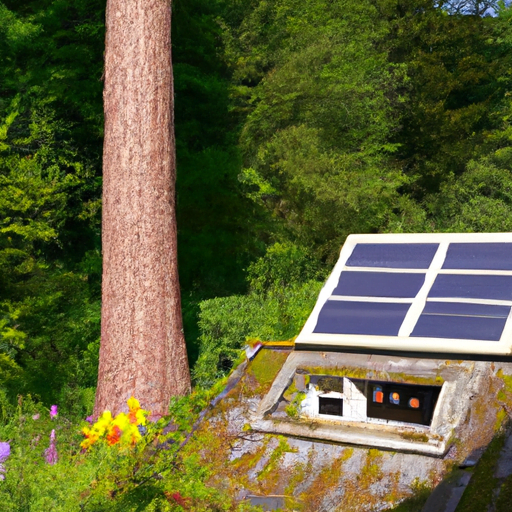So, have you ever wondered what it would be like to live off the grid? You know, no electricity bills, no running water, just you and nature. It sounds pretty idyllic, right? Well, today I want to dive into the topic of off-grid living, specifically in the UK.
Living off the grid means being completely self-sufficient and independent from public utilities. It’s about embracing a simpler way of life, one that relies on renewable energy sources like solar panels and wind turbines. But how much does it actually cost to live off the grid in the UK?
Well, the cost can vary depending on a number of factors. First and foremost, there’s the initial investment in the equipment you’ll need, such as solar panels, batteries, and a backup generator. Then, there are ongoing costs like maintenance, repairs, and replacements. Of course, you’ll also need to consider the cost of land if you don’t already own it.
In our upcoming article, we’ll go into more detail about the specific costs and considerations of living off the grid in the UK. From the price of solar panels to the challenges of finding suitable land, we’ll cover it all. So, if you’ve ever dreamed of ditching the modern conveniences and going off the grid, stay tuned because we’ve got you covered. Living off the grid has become an increasingly popular lifestyle choice for many people in the UK. It offers a unique opportunity to disconnect from the traditional ways of living and rely on self-sufficient and sustainable methods. However, before embarking on this lifestyle, it is crucial to understand the costs involved. In this article, we will explore the various components of off-grid living and calculate the expenses associated with it.
What is Off-Grid Living?
Off-grid living refers to a lifestyle in which individuals or communities are self-sufficient and do not rely on public utilities such as electricity, water, or sewage systems. Instead, they generate their own energy, collect and purify their water, manage waste, and produce their own food. This lifestyle allows individuals to live in harmony with nature, reduce their environmental impact, and gain a greater sense of independence.
Advantages of Living Off the Grid
There are several advantages to living off the grid in the UK. Firstly, it offers a reduced environmental impact as individuals rely on renewable energy sources and adopt sustainable practices. Additionally, off-grid living promotes self-sufficiency, allowing individuals to have greater control over their resources and reducing their dependence on external factors. Furthermore, it can lead to significant cost savings in the long run, as individuals generate their own energy and produce their own food, eliminating monthly utility bills.
Challenges of Off-Grid Living
While off-grid living offers numerous benefits, it also comes with its fair share of challenges. One of the main challenges is the initial setup cost. Building an off-grid system, including solar panels, wind turbines, and water collection systems, can be expensive. Additionally, off-grid living requires individuals to have a certain level of technical knowledge and skills to maintain and repair their systems. Another challenge is the limited access to resources. Living off the grid often means being located in remote areas, which can make it difficult to access healthcare services, emergency assistance, and daily amenities.

Essential Components for Off-Grid Living
To live off the grid successfully, there are several essential components that need to be considered:
Energy Generation
Generating your own energy is a crucial aspect of off-grid living. Solar power is one of the most common and reliable methods used. By installing solar panels, you can harness the power of the sun and convert it into electricity. Wind power and hydro power are also viable options, depending on the geographical location. These sources of energy can provide electricity to power your home and meet your daily needs.
Water Supply
Having a reliable and sustainable water supply is essential for off-grid living. Collecting rainwater through a rainwater harvesting system is a popular method. This water can then be filtered and purified for drinking and household use. Alternatively, drilling a well and installing a pump can provide a constant supply of fresh water. Conserving and reusing water is also crucial to minimize waste.
Waste Management
Proper waste management is essential for off-grid living to maintain a clean and healthy environment. Composting toilets and greywater systems are commonly used to manage waste. Composting toilets break down waste into compost, which can then be used as fertilizer for gardens. Greywater systems collect and filter water from sinks, showers, and washing machines, allowing it to be reused for irrigation.
Food Production
Growing your own food is an integral part of living off the grid. Setting up a vegetable garden, fruit trees, or even a greenhouse can provide a sustainable source of fresh produce. Additionally, raising livestock and poultry can provide meat, eggs, and dairy products. By producing your own food, you reduce your reliance on external sources and have greater control over the quality and sustainability of what you consume.
Calculating the Cost of Off-Grid Living
To better understand the cost of living off the grid, it is important to analyze the various expenses involved:
Initial Setup Costs
The initial setup costs for off-grid living can vary significantly depending on the size and complexity of the system. On average, setting up a basic off-grid system, including solar panels, batteries, and inverters, can cost between £10,000 and £20,000. However, more advanced systems that incorporate wind power or hydro power can cost significantly more. It is important to consider these upfront costs when deciding to transition to an off-grid lifestyle.
Energy Costs
Once the off-grid system is set up, the ongoing energy costs are relatively low. The primary expense is the maintenance and occasional replacement of batteries, which can occur every 5-10 years. Additionally, if your energy production falls short, you may need to rely on a backup generator, which requires fuel and maintenance costs. Overall, the energy costs of living off the grid are significantly lower compared to traditional utility bills.
Water Costs
The cost of water for off-grid living largely depends on the method of water collection and purification. Rainwater harvesting systems require minimal maintenance and filtering costs. However, if you choose to drill a well, there may be initial drilling and pump installation costs. Additionally, ongoing costs may include water testing, filter replacement, and occasional maintenance. Nevertheless, the water costs for off-grid living are generally lower compared to traditional water bills.
Food Costs
Producing your own food can be a cost-effective way of living off the grid. By growing your own vegetables, fruits, and herbs, you reduce the need to purchase these items from grocery stores. However, it is important to consider the initial setup costs for gardening tools, seeds, and compost. Additionally, raising livestock may require initial investments in fencing, animal shelters, and feed. Despite these initial costs, the long-term savings on food expenses can be significant.
Factors Affecting the Cost of Living Off the Grid
Several factors can influence the cost of living off the grid in the UK:
Geographical Location
The geographical location plays a significant role in determining the cost of off-grid living. If your location receives ample sunlight for solar power or has consistent wind patterns for wind power, the initial setup costs for energy generation may be lower. On the other hand, if your location has limited access to water sources, you may need to invest in additional water storage and purification systems.
Size and Design of the Off-Grid System
The size and design of the off-grid system also affect the cost. Larger systems, capable of generating more energy or collecting more water, will be more expensive than smaller systems. Additionally, incorporating advanced technology or high-quality components may increase the upfront costs. It is important to find a balance between system size, functionality, and budget.
Personal Consumption Habits
Your personal consumption habits will impact the overall cost of living off the grid. If you are mindful of your energy and water usage, you can minimize costs by optimizing your systems and reducing waste. On the other hand, excessive consumption can lead to higher energy and water costs. It is important to monitor your usage and adopt efficient practices to maximize cost savings.
Availability of Local Resources
The availability of local resources can significantly impact the cost of off-grid living. If you have access to abundant natural resources, such as wood for heating or an abundance of rainfall for water collection, your costs may be lower. Conversely, if resources are scarce or need to be transported from a distance, expenses can increase. It is important to consider the availability of local resources when planning your off-grid lifestyle.

Exploring Available Off-Grid Technologies
Several off-grid technologies are available to support sustainable living:
Solar Power
Solar power is one of the most popular methods of generating energy off the grid. By installing solar panels on your property, you can convert sunlight into electricity. This energy can be stored in batteries for later use or used instantly to power your home.
Wind Power
Wind power is another reliable source of energy for off-grid living. Wind turbines capture the kinetic energy of the wind and convert it into electricity. If your location has consistent wind patterns, wind power can provide a significant amount of energy.
Hydro Power
Hydro power utilizes the kinetic energy of flowing or falling water to generate electricity. If you have a river or a stream on your property, a small-scale hydro power system can be an efficient and environmentally friendly method of generating energy.
Biogas Digesters
Biogas digesters are systems that convert organic waste, such as food scraps and animal manure, into biogas. This biogas can be used for cooking, heating, and generating electricity. Biogas digesters are a sustainable alternative to traditional energy sources and help reduce waste.
Alternative Off-Grid Living Options
Living off the grid does not necessarily mean living in a rustic cabin. There are several alternative options for off-grid living in the UK:
Tiny Houses
Tiny houses are small, compact homes that maximize space efficiency. These homes can be designed to be off-grid, incorporating renewable energy systems, water conservation methods, and sustainable building materials. Tiny houses offer a minimalist lifestyle with a smaller eco-footprint.
Converted Vehicles
Converting a vehicle, such as a van or bus, into a livable space is another off-grid living option. These converted vehicles, known as campervans or motorhomes, can be equipped with solar panels, water tanks, and composting toilets. They provide the flexibility to travel and explore while maintaining an off-grid lifestyle.
Self-Built Eco-Homes
Building your own eco-home allows you to customize the design and incorporate sustainable features. From straw bale construction to earthships, there are various self-building methods that can be used to create an off-grid home. With careful planning and consideration, self-built eco-homes offer a unique and sustainable living experience.
Benefits of Living Off the Grid in the UK
Living off the grid in the UK offers several benefits:
Reduced Environmental Impact
One of the main advantages of living off the grid is the reduced environmental impact. By relying on renewable energy sources, conserving water, and practicing sustainable farming methods, individuals can significantly reduce their carbon footprint and contribute to a healthier planet.
Greater Self-Sufficiency
Living off the grid promotes self-sufficiency by allowing individuals to produce their own resources, such as energy and food. This independence provides a sense of empowerment and freedom from external factors, creating a more resilient and sustainable lifestyle.
Cost Savings
Although the initial setup costs for off-grid living can be significant, the long-term cost savings can be substantial. By generating your own energy, collecting rainwater, and producing your own food, you eliminate or greatly reduce monthly utility bills. This can result in significant savings over time.
Sustainability Considerations for Off-Grid Living
To ensure a sustainable off-grid lifestyle, several considerations need to be taken into account:
Renewable Energy Sources
When setting up an off-grid energy system, it is important to prioritize renewable energy sources such as solar power, wind power, or hydro power. These sources are clean, abundant, and do not contribute to greenhouse gas emissions.
Water Conservation
Conserving water is essential for off-grid living. Implementing efficient water fixtures, such as low-flow toilets and showerheads, and practicing water-conscious habits can significantly reduce consumption and ensure a sustainable water supply.
Permaculture Principles
Permaculture principles can guide off-grid living by promoting sustainable agricultural practices. Utilizing companion planting, soil enhancement techniques, and natural pest control methods can help create a self-sustaining and regenerative food production system.
Challenges and Limitations of Off-Grid Living in the UK
While off-grid living has many advantages, there are also challenges and limitations to consider:
Planning and Building Regulations
In some areas of the UK, strict planning and building regulations can limit the flexibility of off-grid living. Obtaining the necessary permits and adhering to regulations can be time-consuming and costly. It is important to research local regulations before pursuing an off-grid lifestyle.
Access to Healthcare and Emergency Services
Living off the grid often means being located in remote areas with limited access to healthcare facilities and emergency services. It is important to plan for medical emergencies and have a contingency plan in place, as emergency response times may be longer in rural areas.
Social Isolation
Living off the grid can lead to social isolation due to the remote location and limited interaction with the broader community. It is important to consider the impact on social connections and find ways to maintain a sense of community, such as participating in local events or joining off-grid living communities.
Conclusion
Living off the grid in the UK offers unique opportunities for self-sufficiency, reduced environmental impact, and cost savings. By carefully considering the essential components, calculating the costs, and exploring available technologies, individuals can make informed decisions about their off-grid lifestyle. While challenges and limitations exist, with proper planning and consideration, off-grid living can provide a fulfilling and sustainable way of life. So, if you are willing to embrace a simpler lifestyle and take control of your resources, living off the grid in the UK may be the right choice for you.




